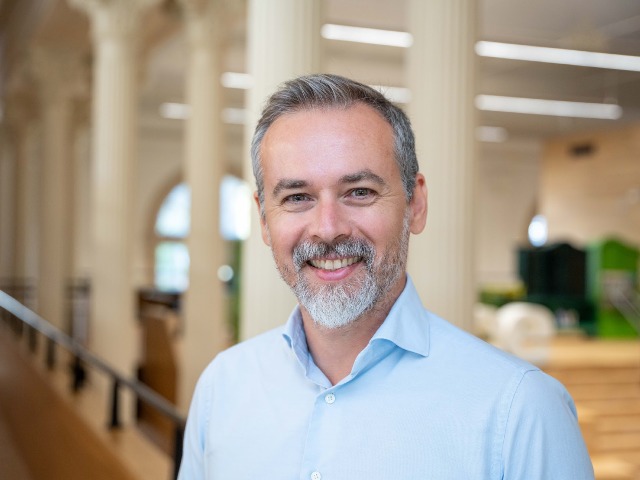Meet Dr. Dario Rodighiero, Assistant Professor of Science and Technology Studies
| Date: | 21 November 2023 |

Who would be your teachers if you chose to study Data Science & Society (DSS) here at Campus Fryslân? Let’s find out! Today, we introduce Dr. Dario Rodighiero, Assistant Professor of Science and Technology Studies at the Knowledge Infrastructure department, and Coordinator of the Data Wise minor at the University of Groningen.
First things first: what is your academic background and overall expertise?
I graduated with a BSc in Computer Science from the University of Milano-Bicocca and pursued a master's degree in the Theory and Technology of Communication. I also collaborated with the design school Domus Academy, where I developed a keen interest in aesthetics and graphic design. My journey continued in Switzerland with a PhD at EPFL, which led me to post-doctoral research at MIT and Harvard University with the support of two fellowships from the Swiss National Science Foundation. Today, I am primarily a digital humanist with a strong background in technology and design with extensive experience in scientific and cultural archives.
What specific subjects do you teach, and what are they about?
I work in the field of Science & Technology Studies (STS), exploring the societal impact of digital technologies, especially recent developments in Artificial Intelligence. At BSc DSS, in my STS courses, I adopt a forensic approach, examining how digital platforms shape our daily lives, encouraging students to develop a critical perspective on technology’s strengths and weaknesses. The different nationalities in my classes offer diverse perspectives to explore how these topics unfold across the world.
I teach two other courses at BSc DSS: Visualizing Data and Visual Rhetoric. These courses focus on data and visual literacy, covering practical aspects of typography, colour usage, page layouts, digital interfaces with respect to today’s digital technologies.
Alongside this teaching, I coordinate the Data Wise minor, complementing the university's bachelor programmes by offering a general introduction to data science. It includes collaborative data projects with local organisations such as the municipality of Groningen, the province of Drenthe, CBS Statistic Netherlands, etc.
The DSS bachelor can be seen as a spinoff of Data Wise, developed along similar lines.
What inspired your involvement in the field of Data Science?
My journey into data science felt very natural. I chose Computer Science because of my interest in computers, not just for what they could do but for the objects themselves. During my academic stay in Paris from 2010 to 2012 at Bruno Latour’s Sciences Po médialab, I was drawn to the emerging field of data visualisation, which perfectly aligned with my interdisciplinary interests. Data visualisation brought together a scientific community of information designers and data scientists.
What sets our programme apart and makes it appealing to students?
Our programme's unique strength lies in its balance between technical and humanistic disciplines, which I haven't seen elsewhere. Data science programmes are often technically focused. Here, we provide a comprehensive view of data science, immersing students in a broad data scientist mindset. We address privacy, regulation, and real-life societal applications. This approach is a return to the holistic knowledge of the past, where technical and humanistic perspectives were integrated, as exemplified by Leonardo da Vinci. In our BSc, we offer a comprehensive approach to data science.
Anything else prospective students should know?
The Netherlands is at the forefront of research and academic programme development. Campus Fryslân is particularly innovative, creating a revolutionary teaching environment. Our multi-disciplinary faculty reflects the interdisciplinary nature of our educational programmes. In DSS, even though data science is the main subject, we, the professors, come from diverse research fields. It's a unique and rare experiment that provides students with a distinctive perspective on data science.

